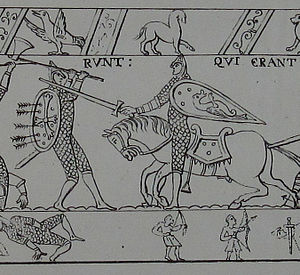- Housecarl
-
 Cette partie de la Tapisserie de Bayeux montre probablement un chevalier normand (à droite) affrontant un housecarl (à gauche) [1].
Cette partie de la Tapisserie de Bayeux montre probablement un chevalier normand (à droite) affrontant un housecarl (à gauche) [1].
Les Housecarls (du vieux norrois hous, maison, et carl, homme) sont une garde personnelle des seigneurs et rois vikings, ainsi que des rois anglo-saxons.
Sommaire
Etymologie
Huscarl également orthographié, en vieux norrois húskarl c'est-à-dire l'homme de maison, l'homme armé. Ils étaient membres du personnel, des serviteurs ou des gardes du corps au service d'un roi ou d'un chef scandinave au cours des périodes vikings en particulier.
Historique
L'âge d'or des housecarls se situe entre 1015 et 1035 en tant que force d'occupation danoise en Angleterre sous Canut le Grand.
Les housecarls étaient des mercenaires, armés d'une longue hache, qui étaient d'une grande loyauté envers leurs employeurs. Ils étaient les seuls militaires de carrière dans le royaume d'Angleterre, mais d'un nombre relativement faible, évalué à environ 2 000. Le reste de l'armée étant composés de miliciens, de paysans et également d'autres mercenaires aventuriers.
Toutefois un impôt permit de payer 3 000 housecarls royaux qui étaient logés et nourris aux frais du roi et qui intervenaient dans certaines tâches administratives en temps de paix en tant que représentants du roi.
Harold II d'Angleterre et environ 3 500 housecarls combattirent à la bataille de Stamford Bridge le 25 septembre 1066, avant d'arriver fourbus au nombre de 2 000 à la bataille d'Hastings le 14 octobre de la même année.Références
- Terence Wise, Saxon, Viking and Norman, Osprey, 1979 [lire en ligne]
Lien externe
Catégories :- Histoire de l'Angleterre médiévale
- Vikings
- Glossaire militaire
- Institution militaire médiévale
Wikimedia Foundation. 2010.
